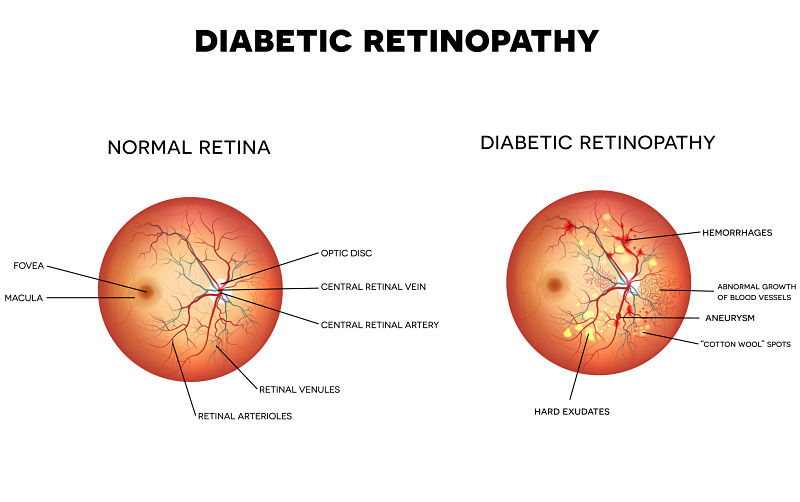Diabetes and the Eye
Diabetic eye disease typically involves a series of potential diseases and eye problems that occur as a result of a patient being diabetic. All of these diabetic eye diseases or issues can actually cause permanent vision loss due to the fact that they all focus around the area of the retina and the optic nerve. It is important to understand that the optic nerve is responsible for transmitting the images collected by the eye to the brain. Some of the main diabetic eye diseases include diabetic retinopathy, glaucoma, retinal detachment, and even the development of cataract sooner than expected.
Diabetic Retinopathy is a very serious eye disease and leading cause of adult vision loss that affects the retina. The retina is a very important part of transmitting visual images to the brain. This disease is caused by extreme changes in the blood vessels near the retina. These blood vessels actually swell up and leak. In other cases of diabetic retinopathy patients experience blood vessels that expand and grow on the surface of the retina.
Having diabetes can be challenging enough with all of the strict dietary and medical efforts that need to make, that paying attention to potential eye problems is often overlooked. It is our goal to educate diabetic patients regarding the potential risks that they may face. Before understanding the disease in complete detail the most important thing to do is get regular eye exams with a qualified ophthalmologist who understands the complexity of this disease. Diabetic patients most at risk include those with type 1 and type 2 diabetes. The longer someone has diabetes the more likely this can be damaging. There are estimates that all diabetic patients have some level of diabetic retinopathy. Diabetic retinopathy is predicted to be present in 90 percent of those who have had the disease for more than 20 years. This disease will gradually impair your vision and lead to blindness if left unchecked. Diabetic retinopathy often brings no symptoms in the early stages. Vision may not be affected until this eye disease becomes critical.

Before treatment is required there are some things that diabetic patients can do to limit the progression of this disease. According to the National Eye Institute, The Diabetes Control and Complications Trial showed that better control of blood sugar levels slows the development and progression of diabetic retinopathy. There are various reasons to keep control over blood sugar levels so make sure to add prevention of vision loss and eventual blindness to that list. Most important we stress the importance of very regular eye exams and a relationship with a qualified ophthalmologist.
Diabetic Retinopathy Treatment
Treatment is not required in the initial stages of diabetic retinopathy, but laser treatment is required once the disease enters the proliferative stage. This laser treatment is commonly referred to as a scatter laser treatment. This treatment is designed to shrink the abnormal blood vessel growth on the retina. For a more thorough explanation of the laser treatment for diabetic retinopathy please feel free to consult your ophthalmologist directly.
Vitrectomy
Another treatment method for treating diabetic retinopathy is known as Vitrectomy. Vitrectomy is more common in cases where leaking or bleeding of the blood vessels is present. During this procedure, the ophthalmologist makes an incision in the eye and extracts the vitreous gel that is clouded with blood.
Anti-VEGF injections
Anti-VEGF injections is another treatment method for diabetic retinopathy which aims at stopping the growth of new, abnormal blood vessels on the retina and macula.
